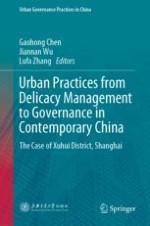This book focuses on the practice and experience of urban delicacy governance in Xuhui District, Shanghai. As we know, urbanization is the inevitable course for agricultural civilization to move towards industrial civilization. Over the past forty years, the urbanization of China has developed rapidly and has become an important push for economic development and social progress. At the same time, the rapid expansion of city scale, the shortage of public services, environmental pollution, traffic congestion, housing tension, as well as other urban pain points have emerged, and these have brought about serious challenges to urban governance. Delicacy management is the concentrated expression of modern scientific management theory and the inherent requirement to realize the modernization of national governance systems and governance capability. From delicacy management to delicacy governance, urban governance needs the transformation of logic. Shanghai has been identified as the only super city in the Yangtze River Delta and East China. It is of great significance to understand the theory and practice of urban governance in Shanghai. Meanwhile, Xuhui District is one of the seven central urban areas in Shanghai with a profound historical background, important institutions, advanced science and education.
